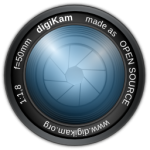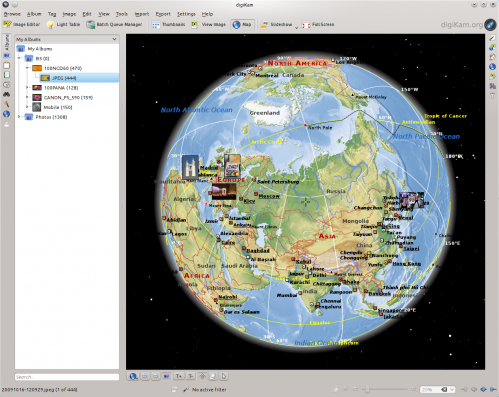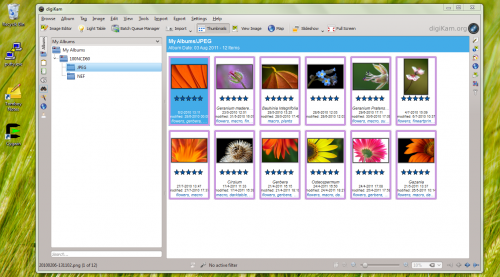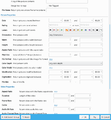Digikam
 |
瀏覽,管理,編輯,增強,組織,標記和分享圖片。 |
DigiKam 支持導入相機的照片,創建相冊,標記日期,題材和其他屬性,和優秀的搜索功能。請查閱手冊了解完整的細節,包括支持的圖片格式。
管理你的照片
-
相冊視圖
-
時間線視圖
-
瀏覽Exif信息
-
地理化(添加地理位置)
-
搜索視圖
-
高級搜索
-
識別重複項
-
模糊搜索
圖片編輯器
-
標記
-
指派評分
-
調整顏色級別
-
白平衡調整
-
轉換到黑和白
-
消除紅眼
-
自動顏色糾正
-
鏡頭自動糾正
相機界面
-
從可移動介質中讀取
-
或從相機中讀取
-
直接保存到相冊
-
添加地理定位到個人照片
燈桌
-
對比一組照片
-
檢查細節
-
評分使得選擇更容易
-
查看相機設置
ShowFoto
對於那些覺得 DigiKam 界面過於技術向的人,ShowFoto 給於了一個常見流行的界面來訪問同樣的工具。
-
瀏覽
-
圖片屬性
-
瀏覽圖片屬性
-
又是地理化
-
預設縮放
-
直方圖
-
常規設置
-
工具提示選項
-
Raw圖片設置
-
色彩管理設置
-
檔案保存選項
-
幻燈片放映設置
這個專案的支持頁面有鏈接指向Frequently Asked Questions (FAQs)和郵件列表訂閱細節。
有一份短的視頻預覽在這裡。
有關數字資產管理(Digital Asset Management)的章節不再存放在web頁面上,而是在手冊上,有可能作為digikam-doc在你的安裝中出現,或者你可以下載一系列的.pdf 檔案,digikam.pdf,showfoto.pdf和kipi-plugins.pdf
rm42 的 blog 開源碼照片處理的新紀元突出自 KDE 3 版本以來的發展,提供了一份有用的預覽。
這裡有 Digikam 教學。
Useful digiKam Tricks
Transcribed from Dmitri Popov's blog, 26 September 2011
- To quickly adjust thumbnail size in the Album view, press and hold the Ctrl key, then use the mouse scroll wheel to make the thumbnails larger or smaller.
- With the feature enabled, digiKam automatically hides originals and displays the latest modified versions of the photos. For example, if you process a NEF file and save it in the JPEG format, digiKam hides the original RAW file and shows only the JPEG photo. To disable this feature, choose and make sure that the option in the In main view section is enabled. To keep things tidy, you can then group the original and all its versions. To do this, select the photos you want to group, right-click on the selection, and choose .
The trash has reached its maximum size! Cleanup the trash manually
If you receive this error message and emptying the Trash doesn’t help, then the following command may solve the problem:rm ~/.local/share/Trash/metadata
- Need to quickly locate all untagged photos? In digiKam, expand the left sidebar, and press the button. In the window, tick the check box and press to run the search.
- Instead of the conventional thumbnail view, digiKam lets you map your photos on a globe. Choose , and you should see photos from the current album mapped on the 3-D globe. You can then use the mouse to rotate the globe and the mouse wheel to zoom in and out. Obviously, the Map view displays only geotagged photos.

digiKam 2.2.0 Installer for Windows
In his blog of 22 October, 2011, Dmitri Popov writes:
"Good news for those who want to run the latest version of digiKam on Windows. The SourceForge repository now has a Windows installer of the latest digiKam version courtesy of Ananta Palani.

I tested the installer with a Windows 7 machine, it worked like a charm. While the installer makes it supremely easy to deploy digiKam on Windows, the application does have a few quirks. Most notably, the Windows version of digiKam cannot import photos directly from storage media or cameras, so you need to copy them to the hard disk using Windows’ own built-in image transfer tool, and then add the transferred photos to digiKam. The Trash feature doesn’t work either, but you can work around this issue by deleting photos instead of sending them to the trash. To be fair, though, these issues are not caused by digiKam itself, but are due to bugs in the underlying KDE libraries which the application relies on."





































